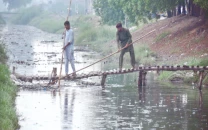Need stressed to preserve evidence in assault cases
Sexual assault survivors often deprived of justice due to loopholes in the medico-legal procedure of documentation.

WAR Director Sarah Zaman said, “The survivor’s personal statement and collaboration is a very crucial part of the medico-legal process. If it is not recorded properly, the case tends to get weakened.”
She said that WAR representatives searched for survivors by going from district to district. “The sense of insult and shame is so strong, that victims often avoid reporting or approaching us, or any other organisation, that can bring them relief,” she said.
Those who report tend to hide embarrassing details.
WAR targets to provide legal aid to at least 20 cases, out of an average of 100 reported cases annually. Human Rights Commission of Pakistan estimates that only 60 per cent of rape cases are reported. The rest go unreported or are withdrawn by the survivors.
Sidra Humayun, the WAR Lahore administrator, said that the 14 public hospitals in Lahore have only two women medico-legal officers (WMLO) for the more than 9 million population. “It might be a shocking number, but not as shocking as the Karachi’s total 5 WMLOs in three public hospitals,” she added.
The main focus of discussion was the forms used by the MLOs while recording the survivor’s case. The three forms at the Karachi public hospitals and a common form used in the hospitals in Lahore were studied. The WAR representatives also presented a recommended form that, they said, should be used all over the country.
Zaman told the meeting that the previous hand written form was recently abolished by the Lahore High Court’s chief justice for legibility.
Dr Naeem Zafar, president of Pehchan, an NGO working for the protection of children against sexual abuse, suggested that updating the forms was as important as training the MLOs. “MLOs are just thrown into this field. Since there are just a few vacancies, there’s a lot of nepotism,” he said.
“MLOs often fail to record the narrative and the physical evidence properly,” Humayun said. Another crucial problem, she added, was not getting an informed consent from the survivors. “MLOs have to be trained and taught that a medical examination does not always have to follow registration of an FIR. It is entirely the survivor’s decision to disclose the information to the police.”
A prompt medical examination is necessary for recording the evidence. Besides losing physical evidence, delayed reporting can be used against the survivor.
A consultative meeting of a similar nature will be held in Islamabad next week.
Published in The Express Tribune, October 29th, 2010.


















COMMENTS
Comments are moderated and generally will be posted if they are on-topic and not abusive.
For more information, please see our Comments FAQ